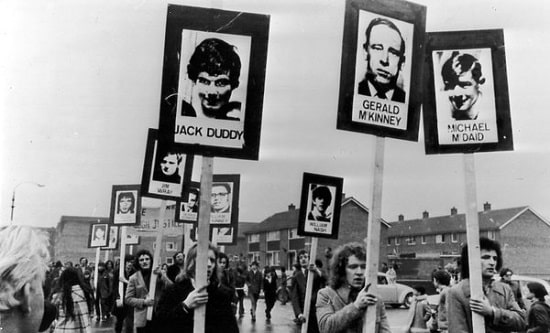On 23 October 2025, the former British paratrooper known only as Soldier F was acquitted of all charges in relation to the 1972 Bloody Sunday killings in the occupied north of Ireland. This verdict is not a legal anomaly but a political inevitability. It exposes yet again that justice can never come through the institutions of the oppressor.
Soldier F had faced two counts of murder for the killings of William McKinney and James Wray, and five counts of attempted murder of other unarmed civilians. The case centred on Bloody Sunday in Derry, 30 January 1972, when British soldiers opened fire on a peaceful civil rights demonstration against internment without trial, shooting 26 unarmed civilians. Fourteen were killed, and 12 wounded in a deliberate act of imperialist terror to crush the rising protest movement and attempt to stifle the growing support for political prisoners.
In 2010, Fight Racism! Fight Imperialism! argued that the expensive and prolonged Saville Inquiry into the events of Bloody Sunday was part of ‘a political process designed to pacify nationalist anger and stabilise British rule’. Fifteen years on, the Soldier F verdict vindicates that analysis. The state can apologise, investigate, even feign remorse, but it cannot convict itself. Every inquiry, every tribunal, is a mechanism for containment – never for liberation.
Bloody Sunday was not an accident or the act of rogue soldiers. It was the deliberate expression of British imperialism. When paratroopers opened fire on unarmed marchers, they exposed the true nature of the imperialist state. The massacre shattered the illusion that the Irish civil rights movement could win equality through peaceful protest. The violence of the state changed everything, revealing that freedom would require organised and armed self-defence.
It had already been written in blood at Ballymurphy months earlier, when the same regiment murdered civilians during the introduction of internment. British troops were deployed to prop up the Orange state and defend unionist supremacy. British imperialism had declared war on the Irish people, and the people, in turn, organised for their own protection and liberation.
Whatever indignation Sinn Féin may now express, this verdict is an inevitable outcome of a flawed political strategy that seeks justice through British courts. Judicial remedies within the imperial system are a con trick – a theatrical performance designed to legitimise occupation and pacify resistance. By placing faith in the legal institutions of the occupier, Sinn Féin has accepted the parameters of imperialism itself.
Those who live in Britain should take note. The same state that massacred the people of Derry also denies justice to the families of Grenfell Tower, Hillsborough and Windrush. The same judiciary that absolves imperialist killers abroad protects police violence and corruption at home. Each inquiry follows the same pattern – delay, denial and deception.
In recent weeks, Irish republicans who refuse to bow have again been targeted by the forces of the British state. MI5 operatives harass and intimidate republican activists on Irish streets – a reminder that British imperialism has unfinished business. Irish political prisoners remain incarcerated today. What was once open occupation has become covert domination, rule through agents, informers and terror tactics. The method has changed, but the objective remains: to suppress revolutionary politics and maintain imperialist rule.
The wound of Bloody Sunday remains open. Justice will not be found in British courts or parliamentary deals. It lies in the dismantling of the imperialist presence in Ireland – political, military and economic.
Paul Mallon
Read the original 2010 article here




